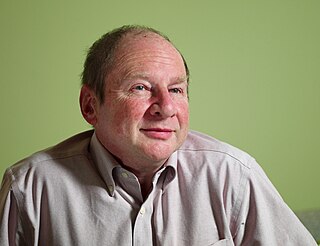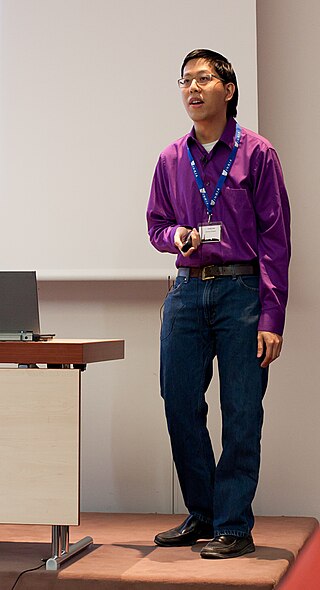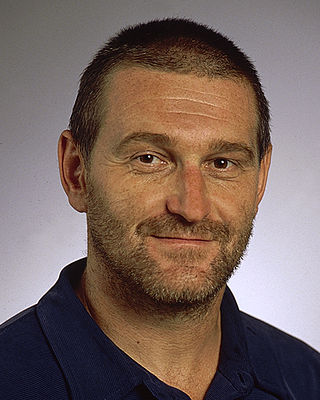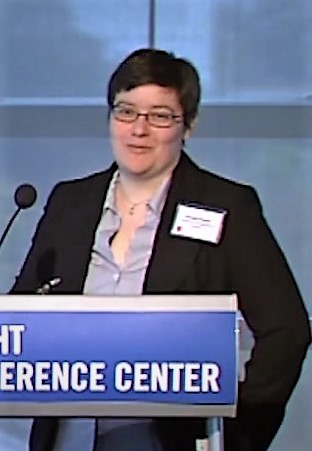Related Research Articles

Computer science is the study of computation, information, and automation. Computer science spans theoretical disciplines to applied disciplines.
Computational geometry is a branch of computer science devoted to the study of algorithms which can be stated in terms of geometry. Some purely geometrical problems arise out of the study of computational geometric algorithms, and such problems are also considered to be part of computational geometry. While modern computational geometry is a recent development, it is one of the oldest fields of computing with a history stretching back to antiquity.
Theoretical computer science is a subfield of computer science and mathematics that focuses on the abstract and mathematical foundations of computation, such as the theory of computation, formal language theory, the lambda calculus and type theory.

Harold Abelson is an American mathematician and computer scientist. He is a professor of computer science and engineering in the Department of Electrical Engineering and Computer Science at the Massachusetts Institute of Technology (MIT), a founding director of both Creative Commons and the Free Software Foundation, creator of the MIT App Inventor platform, and co-author of the widely-used textbook Structure and Interpretation of Computer Programs, sometimes also referred to as "the wizard book."
Jeffrey David Ullman is an American computer scientist and the Stanford W. Ascherman Professor of Engineering, Emeritus, at Stanford University. His textbooks on compilers, theory of computation, data structures, and databases are regarded as standards in their fields. He and his long-time collaborator Alfred Aho are the recipients of the 2020 Turing Award, generally recognized as the highest distinction in computer science.

Timothy Moon-Yew Chan is a Founder Professor in the Department of Computer Science at the University of Illinois at Urbana–Champaign. He was formerly Professor and University Research Chair in the David R. Cheriton School of Computer Science, University of Waterloo, Canada.

David Arthur Eppstein is an American computer scientist and mathematician. He is a distinguished professor of computer science at the University of California, Irvine. He is known for his work in computational geometry, graph algorithms, and recreational mathematics. In 2011, he was named an ACM Fellow.

Abbas Edalat is a British-Iranian academic who is a professor of computer science and mathematics at the Department of Computing, Imperial College London and a political activist. In a 2018 letter to The Guardian, 129 experts in computer science, mathematics and machine learning described him as "a prominent academic, making fundamental contributions to mathematical logic and theoretical computer science" Edalat also founded SAF and CASMII, a campaign against sanctions and military intervention in Iran.

Jorge Stolfi is a full professor of computer science at the State University of Campinas, working in computer vision, image processing, splines and other function approximation methods, graph theory, computational geometry and several other fields. According to the ISI Web Of Science, as of 2010 he was the most highly cited computer scientist in Brazil. Outside of academia, Stolfi has accrued an online following due to his skepticism and comments on Bitcoin.

Kurt Mehlhorn is a German theoretical computer scientist. He has been a vice president of the Max Planck Society and is director of the Max Planck Institute for Computer Science.
Roberto Tamassia is an American Italian computer scientist, the Plastech Professor of Computer Science at Brown University, and served as the chair of the Brown Computer Science department from 2007 to 2014. His research specialty is in the design and analysis of algorithms for graph drawing, computational geometry, and computer security; he is also the author of several textbooks.
The Sidney Fernbach Award established in 1992 by the IEEE Computer Society, in memory of Sidney Fernbach, one of the pioneers in the development and application of high performance computers for the solution of large computational problems as the Division Chief for the Computation Division at Lawrence Livermore Laboratory from the late 1950s through the 1970s. A certificate and $2,000 are awarded for outstanding contributions in the application of high performance computers using innovative approaches. The nomination deadline is 1 July each year.

Pavel Arkadevich Pevzner is the Ronald R. Taylor Professor of Computer Science and director of the NIH Center for Computational Mass Spectrometry at University of California, San Diego. He serves on the editorial board of PLoS Computational Biology and he is a member of the Genome Institute of Singapore scientific advisory board.
Mikhail Jibrayil (Mike) Atallah is a Lebanese American computer scientist, a distinguished professor of computer science at Purdue University.

Data science is an interdisciplinary academic field that uses statistics, scientific computing, scientific methods, processes, scientific visualization, algorithms and systems to extract or extrapolate knowledge and insights from potentially noisy, structured, or unstructured data.
The Heidelberg Institute for Theoretical Studies is a non-profit research institution founded in 2010 by Klaus Tschira, co-founder of SAP, through the Klaus Tschira Stiftung foundation. Situated at the intersection of the natural sciences, mathematics, and computer science, it is dedicated to the exploration of fundamental research, with its core focus being in the realm of processing, structuring, and analysis of datasets, encompassing a diverse array of research fields, from molecular biology to astrophysics.
Daniel Mier Gusfield is an American computer scientist, Distinguished Professor of Computer Science at the University of California, Davis. Gusfield is known for his research in combinatorial optimization and computational biology.

Sorelle Alaina Friedler is an American computer scientist who is an Associate Professor at Haverford College. She is the co-founder Association for Computing Machinery Conference on Fairness, Accountability, and Transparency. Her research seeks to prevent discrimination in machine learning.
Helmut Alt is a German computer scientist whose research concerns graph algorithms and computational geometry. He is known for his work on matching geometric shapes, including methods for efficiently computing the Fréchet distance between shapes. He was also the first to use the German phrase "Algorithmische Geometrie" [algorithmic geometry] to refer to computational geometry. He is a professor of computer science at the Free University of Berlin.
References
- 1 2 3 "Transitions" . Retrieved 2021-05-21.
- ↑ "Why Machines Discriminate—and How to Fix Them - Science Friday". Science Friday. Retrieved 13 April 2017.
- ↑ Gholipour, Bahar (10 March 2017). "Algorithms learn from us — we can be better teachers". NBC News. Retrieved 13 April 2017.
- ↑ Pepitone, Julianne (17 August 2015). "Can Résumé-Reviewing Software Be As Biased As Human Hiring Managers?". NBC News. Retrieved 13 April 2017.
- ↑ Smith-Strickland, Kiona (15 August 2015). "Computer Programs Can Be as Biased as Humans". Gizmodo. Retrieved 13 April 2017.
- ↑ Rich, Motoko (14 April 2006). "'Fibs' Sprout On Web". The New York Times. Retrieved 13 April 2017.
- ↑ "Blogs on Big Data, Business Analytics, Data Mining, and Data Science". KDnuggets. Retrieved 13 April 2017.
- ↑ "HackerNews Search Results for 'geomblog'". Hacker News. Retrieved 13 April 2017.
- ↑ "The Geomblog: Racism/sexism in algorithms • r/MachineLearning". r/MachineLearning. Reddit. Retrieved 13 April 2017.
- 1 2 3 "Suresh Venkatasubramanian". Faculty Activity Report. University of Utah. Retrieved 13 April 2017.
- ↑ Suresh Venkatasubramanian at the Mathematics Genealogy Project
- ↑ "Developer Newsletter: Issue #24". NVIDIA. Retrieved 13 April 2017.
- ↑ "Long-Term Visitors". Simons Institute. UC Berkeley. Retrieved 13 April 2017.